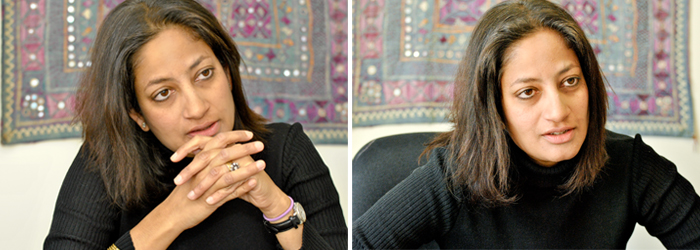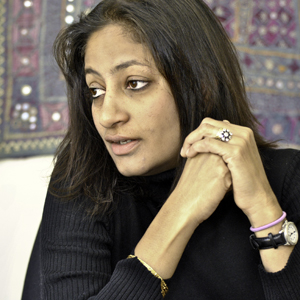
Vrinda Narain practiced as a lawyer in Delhi for six years before taking on an LLM and a DCL degree at McGill. Now an assistant professor cross-appointed in the Faculties of Law and of Arts (at the McGill Institute of Gender, Sexuality and Feminist Studies [IGSF]), she offers her critical take on multiculturalism and comments on what the upheaval in the Middle East means for women there.
You started looking into issues of religious freedom, gender equality and group rights more than a decade ago and your research seems to have only grown in relevance. What are you working on now?
I’m thinking a bit about the idea of culture and the accommodation of difference and it’s very topical and timely because we’re seeing a kind of retreat from multiculturalism, not just in Quebec but all across Europe, with banning the veil and niqab in France and Spain. I think it’s a kind of global phenomenon.
What are the limits of toleration and what does an inclusive democracy look like? How best do pluralist democracies balance gender equality with religious freedom? We hear so much about the crisis of multiculturalism and my argument is that I think we need to take a closer look at multiculturalism and not think of it as something that’s a state-imposed top-down idea. We have to have a more inclusive engagement, including the voices of women and marginalized communities in the public debate.

If we look at the Sharia law proposal in Ontario, for example, although women were interviewed during the process, in the final report that was produced, they were absent. Women get erased from these things.
A lot of liberal democracies are grappling with these problems. The sharia law debate in Ontario and the niqab debate here in Quebec are Canadian questions but they have a global resonance.
What role can an academic play in this discussion?
The role of the academic is to start and pursue an engaged dialog so we can have a more informed debate and an inclusion of perspectives that have been marginalized, particularly Muslim women, racialized women and racialized minority groups.
To be honest, I don’t know how much of a difference academics can make in all of this but at least we have a conversation going.
For lawyers, it’s also a privilege because you can be an academic and write your papers but you can also be an intervenor in a case. There was a recent case in Ontario concerning whether a woman can wear a niqab and testify in court and I was on a committee that drafted one of the factums. You can be in academia and cross over and be comfortable as a lawyer as well. That’s a luxury.
You also cross over between Law and many other disciplines. What is that experience like?
A lot of one’s research these days is not bound by discipline, particularly in law. What I do is at the intersection of constitutional law, feminist legal theory and perhaps some political philosophy.
This term, I’m teaching feminist legal theory and it’s cross-listed with Arts for the first time. I have a mix in my class: I have law students and I have women’s studies students.
It’s interesting because they come at it from a different point of view. The women’s studies students or the Faculty of Arts students have no law background but are more attuned to social science and they analyze things in a different way. The law student is more instrumental: what does the Supreme Court say, what is the ratio, who were the judges but the women’s studies students pay attention to the analytical or theoretical aspects of say, racism and discrimination.
It’s also interesting to blend the two perspectives and make them focus on a case, what actually happened, to keep it real but at the same time to extrapolate from that into creating theory.
What is your take on current events in the Middle East and what the situation there might mean for creating inclusive democracies?
I work with an international solidarity network called Women Living Under Muslim Laws (WLUML) and I was talking to a colleague of mine the other day about the subject.
Historically, women’s movements have made meaningful gains in these kinds of times, when there is a kind of alliance between nationalism and feminism. It’s still a very politically tense time but we need to insert gender equality and women’s rights into the conversation and into the whole pro-democracy movement.
Egypt has a very strong women’s movement, Bahrain has a visible women’s movement.
This is the time to talk about it.
